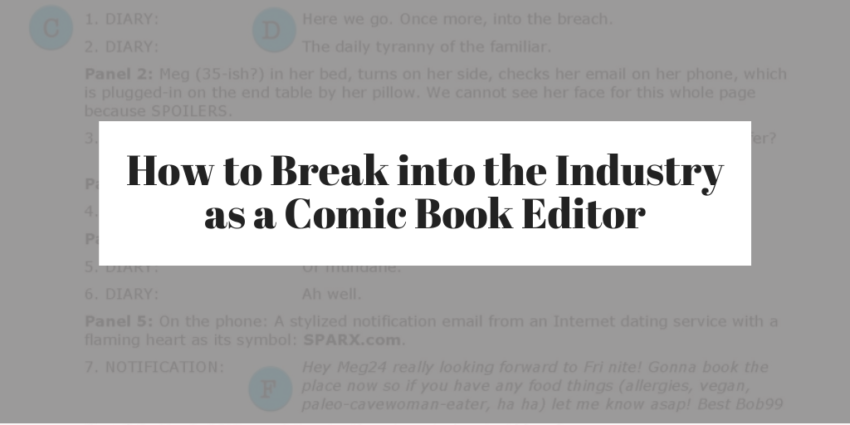Comic book editors are an essential and sometimes overlooked part of the industry. As creator-owned, indie, and self-published comics soar to an all-time high, freelance editors are being needed more and more.
When you make the decision to become a comic book editor, the first thing you have to figure out is what kind of editing you want to do. Do you want to consult on the story? Do you want to do line edits? Or are you wanting to act as the overall project manager? You can do one of these things or all of them, but knowing where your strengths and weaknesses lie is essential.
The job of a traditional freelance comic book editor can be really extensive, and you’re basically a project manager that is responsible for story consultation, line edits, continuity, managing deadlines, getting files together, and keeping the team moving forward. Not to mention, keeping morale up, and sometimes even acting as a bit of a therapist/shoulder to cry on when your team needs it. It can be a really big job that not only requires good technical skills but expert people skills too.
I won’t get into that in detail right now, but if you’re curious about the ins and outs of what exactly that entails, you can take a look at our previous article here: What Is Comic Book Editing?
From there, how exactly do you go about getting work as an editor? How do you build a portfolio? Well…for freelance editing, and like everything else in comics, it can sometimes be about your talent, but unfortunately it can be a lot about who you know. There’s no one set way of breaking in though, so everything here is just from my own experiences and may not be for everyone.
Networking and building up a good professional name for yourself is a great start. Connecting with peers that you admire or just like the work of, and creating a good rapport with them on social media can be super helpful. Twitter can be the absolute pit of hell, but it can also be fantastic for allowing you access to your brilliant creator peers.
That’s your foundation. You’ll need a bit of that before you can move on, and remember that networking can take time, but it’s crucial to do. I had a solid almost-decade of networking in the industry and as a podcaster and journalist before I moved into writing and editing.
Make sure you put in the effort on it, and do it right (don’t be a creep, don’t be rude, don’t just be a fan at other creators). Engage with others and be someone they enjoy talking to. Genuine engagement is the key though; people can smell someone only connecting with them to exploit the relationship.
Finding work isn’t as easy as just waking up one day and thinking, “I’m going to edit comics now!” or even putting yourself out there to social media. And building a portfolio can be difficult. If you’ve connected and found some great mutuals online, you can maybe politely let them know that you’re looking for editing work and ask for them to consider you or pass along your info if they hear of anything…but again, that can be tricky without a portfolio to showcase.
My biggest recommendation for the current market and industry is look for anthologies that are currently being put together and see if they need editors on board. Anthologies have been on the rise over the years and are a great way to get a lot of experience quickly. If you’re struggling to find an anthology (I get it, a lot of folks aren’t in the know about a project until it’s on Kickstarter), something that you can try is running an anthology yourself.
Managing an anthology is an excellent way to make a name for yourself. Because there are so many components to it (submissions, guidelines, payment, crowdfunding, story curation and the actual editing), running a successful book can raise your profile exponentially.
Success in this context doesn’t mean it did amazingly well on Kickstarter or whatever. Success means that you got your project made. Whether that means that it did extremely well on Kickstarter or squeaked by. Whatever. Getting your book over the finish line is the goal.
Anthologies can also notoriously be a bit of a mess though, and it can sometimes be hard to find folks who know what they’re doing. So going into a big project like that prepared and with an understanding of what will make it a good experience is vital.
I HIGHLY recommend reaching out to @TorontoComix on Twitter (or by visiting their web site) for some advice as they not only post up templates to their budgets but also guidelines set in place for submissions, and they provide anyone interested with all the information you could need to put together a successful book.
At the end of the day, there’s no one way to break into the comics industry as an editor, and even using these methods can prove tricky. Every job in comics has to be a passion project because it’s not always easy to find your way. You need that love for the medium and the creators in it to help fuel your fire a LOT of the time. But when you do find your way, the job and your peers can make it SUCH an incredibly rewarding and satisfying experience.
- Pitching Your Comic Book: Pitch Outline Template (UPDATED) - January 17, 2023
- What To Include In Your Portfolio: A Guide for Comic Creators - December 12, 2022
- Networking and Building Genuine Connections - March 21, 2022
